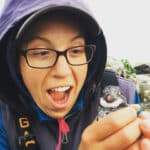Microplastic pollution and the effects of phthalates and other plastic-born chemicals on Alaska’s ecosystems and Alaskans’ health
July 28, 2021 @ 10:00am (AKDT)
On July 28, CHE-Alaska was joined by Veronica Padula from the Bering Sea Campus and Research Center at the Aleut Community of St. Paul Island to hear about her ongoing research and results from a 2020 study ‘Plastic-derived contaminants in Aleutian Archipelago seabirds…”. Phthalates, a known endocrine disruptor, were found in 100% of birds studied. Her work highlights the growing concern for high microplastic concentrations in remote environments and the potential toxic effects of chemical contaminants from plastics moving across the biological boundary into marine food webs. Contaminant circulation in food webs may also play a role in human exposure to phthalates and other plastic-dervied toxics.
Plastic-Derived contaminants in Aleutian Archipelago seabirds with varied foraging strategies (Padula & Beaudreau, 2020) https://www.sciencedirect.com/science/article/abs/pii/S0025326X20305531
Estimating the abundance of floating macro-debris in the marine environment: a comparison between distance sampling and fixed-width strip-transect techniques – Sixth International Marine Debris Conference – Sauria et al, 2018
‘A binding global agreement to address the life cycle of plastics’ published in Science in July 2021 – https://science.sciencemag.org/content/373/6550/43
‘Call for global treaty to end production of Virgin Plastic by 2040’ publised in the Gaurdian summarizing findings of 2021 paper referenced above – https://www.theguardian.com/environment/2021/jul/01/call-for-global-treaty-to-end-production-of-virgin-plastic-by-2040
Phthalate Fact Sheet produced by Alaska Community Action on Toxics – https://www.akaction.org/wp-content/uploads/Phthalates_ACAT2.pdf
NOAA’s marine debris program – https://marinedebris.noaa.gov/
United Nation’s Environment Program 2017 report on ‘Marine Plastic Debris and Microplastics – Global Lessons and Research to Inspire Action and Guide Policy Change’ (275 pages) – https://www.akaction.org/wp-content/uploads/Marine_Plastic_Debris_and_Microplastic.pdf
5 gyres – Science to Solutions – https://www.5gyres.org/
Break Free From Plastic – https://www.breakfreefromplastic.org/
The Plastic Pollution Coalition – https://www.plasticpollutioncoalition.org/
Veronica Padula’s past presentation on CHE-Alaska
Featured speakers
 Veronica Padula is the Academic Program Director at the Bering Sea Campus and Research Center at Aleut Community of St. Paul Island. She received her Master’s in Fisheries from the University of Alaska Fairbanks (UAF) in 2013 and is currently working on her PhD at the School of Fisheries and Ocean Sciences at UAF, investigating the impacts of plastic marine debris and phthalate exposure on Bering Sea food webs. Her work also explores trends in marine debris in this region and threats to subsistence species on St. Paul Island, Alaska.
Veronica Padula is the Academic Program Director at the Bering Sea Campus and Research Center at Aleut Community of St. Paul Island. She received her Master’s in Fisheries from the University of Alaska Fairbanks (UAF) in 2013 and is currently working on her PhD at the School of Fisheries and Ocean Sciences at UAF, investigating the impacts of plastic marine debris and phthalate exposure on Bering Sea food webs. Her work also explores trends in marine debris in this region and threats to subsistence species on St. Paul Island, Alaska.
